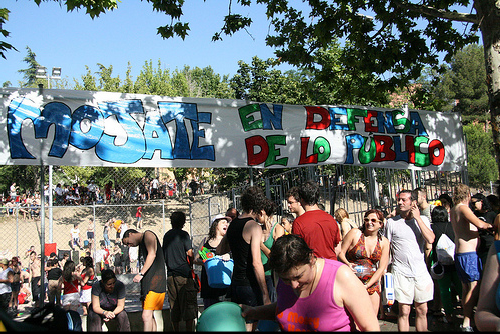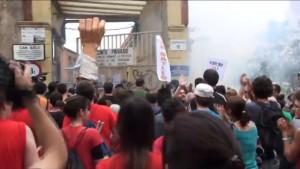 2011 will be the 30th year in which
2011 will be the 30th year in which, in the outskirts of Madrid, and despite the ban of the City Council, the
Naval Battle of Vallekas will take place: a popular and politically engaged
fiesta that celebrates the independence of the neighborhood and its
the proclamation of Vallecas as a seaport. Anthropologist
Elizabeth Lorenzi, got involved in the neighborhood since 1998, and recently published an
ehtnography of the fiesta (downloadable for free in PDF) in which, beginning from the Naval Battle,
she analizes the urban and social transformations of Vallecas in the last decades, the role played in it by the grassroot movements, and the consequences of all this in the building and maintanance of the neighborhood identity. The Naval Battle celebrates and strenghtens the
vallekanismo: the neighborhood as a frame for social mobilizations. Through this symbolic device, the long history of political demands, neighbors' struggles, anarchist movements of Vallecas, become part of the process of constructing the neighborhood identity.

 As in the two previous posts on anthropological theory [post1 - post2], we keep linking texts that could help us to understand the contradictions of an ethnography "within" social activism, i.e. produced inside of a direct engagement with revolutionary political movements, rejecting neutrality and the so-called ethnographic distance, toward the development of an anthropology of action.
As in the two previous posts on anthropological theory [post1 - post2], we keep linking texts that could help us to understand the contradictions of an ethnography "within" social activism, i.e. produced inside of a direct engagement with revolutionary political movements, rejecting neutrality and the so-called ethnographic distance, toward the development of an anthropology of action. 
 2011 will be the 30th year in which, in the outskirts of Madrid, and despite the ban of the City Council, the Naval Battle of Vallekas will take place: a popular and politically engaged fiesta that celebrates the independence of the neighborhood and its the proclamation of Vallecas as a seaport. Anthropologist Elizabeth Lorenzi, got involved in the neighborhood since 1998, and recently published an
2011 will be the 30th year in which, in the outskirts of Madrid, and despite the ban of the City Council, the Naval Battle of Vallekas will take place: a popular and politically engaged fiesta that celebrates the independence of the neighborhood and its the proclamation of Vallecas as a seaport. Anthropologist Elizabeth Lorenzi, got involved in the neighborhood since 1998, and recently published an